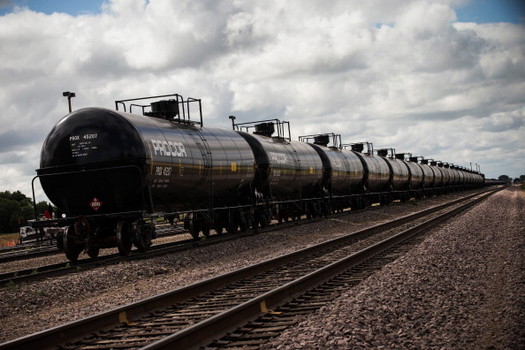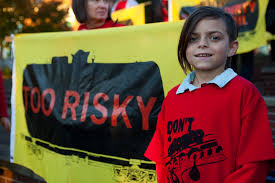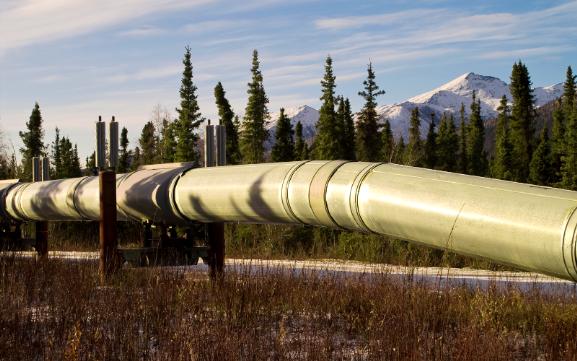It looks like you're using an Ad Blocker.
Please white-list or disable AboveTopSecret.com in your ad-blocking tool.
Thank you.
Some features of ATS will be disabled while you continue to use an ad-blocker.
2
share:
I travel along the Columbia River from Walla Walla, WA to Spokane, WA on a regular basis and my mom and I will see a few trains per trip on our
outings. These trains are not fitted with your normal boxcar, no - but with black tanks of oil that stretch for around a mile behind the engines.
I asked my mom about it, and she said that instead of moving oil by pipeline or by ship, it was increasingly being moved by rail from the north - places like Canada and Alaska - and that especially in Washington State, there had been raised environmental concerns about what would happen during a spill.
I tried to get a few pictures on the past few trips but was unable to get a good shot - luckily, this isn't like a UFO or something, so some pics off the web will suffice as to what I am talking about, verified by my own eyes.


This picture is kind of what I automatically think when I see those trains.
And check out this video. See, I'm not too off being concerned!
-----
Moving Oil by Rail Safely Major Concern - Buffet
Now, I definitely agree with what Warren Buffet has to say here, no issue with that. Most people wouldn't think twice about this article, but I wanted to put up a picture and point out the issue with a potential land-based oil spill.
I asked my mom about it, and she said that instead of moving oil by pipeline or by ship, it was increasingly being moved by rail from the north - places like Canada and Alaska - and that especially in Washington State, there had been raised environmental concerns about what would happen during a spill.
I tried to get a few pictures on the past few trips but was unable to get a good shot - luckily, this isn't like a UFO or something, so some pics off the web will suffice as to what I am talking about, verified by my own eyes.


This picture is kind of what I automatically think when I see those trains.
And check out this video. See, I'm not too off being concerned!
-----
NEW YORK (Reuters) - Warren Buffett, chairman of conglomerate Berkshire Hathaway , said on Wednesday that safety is a major priority for the rail industry, after a recent spate of accidents raised concerns about how to transport oil safely.
"I can tell you that's all they're thinking about," the investor said in an interview with Reuters.
"We're going to move a lot of crude in this country, and we have to learn how to do it very safely," he added.
He added that the delay in the construction of the Keystone pipeline was unlikely to prompt additional purchases of tank cars at Berkshire railroad unit BNSF.
Moving Oil by Rail Safely Major Concern - Buffet
Now, I definitely agree with what Warren Buffet has to say here, no issue with that. Most people wouldn't think twice about this article, but I wanted to put up a picture and point out the issue with a potential land-based oil spill.
edit on 24amThu, 24 Apr 2014 05:18:19 -0500kbamkAmerica/Chicago by darkbake because: (no reason given)
Hmmm...I come from a long line of railworkers. Nearly half of my family and friends. So I might be a little biased, but I'm not too afraid of oil
or anything else for that matter being moved by rail. Freight Rail traffic has a decent traffic record.
The real question for me is what is Buffett trying to profit from? The guy is a money hoarder akin to Scrooge McDuck. That pipeline is more worrisome to me. Right over the Oghallala aquifer...and just looking at leaks of other pipelines...many dont get a lot of press, but all are bad.
The real question for me is what is Buffett trying to profit from? The guy is a money hoarder akin to Scrooge McDuck. That pipeline is more worrisome to me. Right over the Oghallala aquifer...and just looking at leaks of other pipelines...many dont get a lot of press, but all are bad.
a reply to: the owlbear
Good to know your opinion, Owlbear, especially having experience in the field. I have hardly heard of many accidents involving rail, either, I just know it is of concern. It might very well be more dangerous to move by ship or by pipeline.
One thing with a pipeline is that it involves tearing up land to put it in - although I'm not sure what the impact is. Here is a picture of a pipeline in Canada.

Good to know your opinion, Owlbear, especially having experience in the field. I have hardly heard of many accidents involving rail, either, I just know it is of concern. It might very well be more dangerous to move by ship or by pipeline.
One thing with a pipeline is that it involves tearing up land to put it in - although I'm not sure what the impact is. Here is a picture of a pipeline in Canada.

edit on 24amThu, 24 Apr 2014 05:51:03 -0500kbamkAmerica/Chicago by darkbake because: (no reason given)
originally posted by: darkbake
a reply to: the owlbear
Good to know your opinion, Owlbear, especially having experience in the field. I have hardly heard of many accidents involving rail, either, I just know it is of concern. It might very well be more dangerous to move by ship or by pipeline.
One thing with a pipeline is that it involves tearing up land to put it in - although I'm not sure what the impact is. Here is a picture of a pipeline in Canada.
Not just tearing up the farmland, old friend, the leaks...
Much of the farming done where they are planning the Keystone is right over land that is reliant on center pivot irrigation to grow crops, mainly corn and soybeans. A leak in that line could affect that very groundwater and land that is essential for food production.
Because of the shale oil boom much more oil is being transported by rail now... and we're having much more spills.
NY Times
The problem is that, it's still the safest way to transport oil. Pipelines rupture and spill oil or other fun stuff more often than train accidents involving oil occur.
LA Times
While the safety record of railroads has improved in recent years, the surge in oil transportation has meant a spike in spill rates. From 1975 to 2012, federal records show, railroads spilled 800,000 gallons of crude oil. Last year alone, they spilled more than 1.15 million gallons, according to an analyis of data from the Pipeline and Hazardous Materials Safety Administration done by McClatchy Newspapers. That figure includes the Casselton spill, estimated at about 400,000 gallons.
NY Times
The problem is that, it's still the safest way to transport oil. Pipelines rupture and spill oil or other fun stuff more often than train accidents involving oil occur.
Between 2008 and 2012, U.S. pipelines spilled an average of more than 3.1 million gallons of hazardous liquids per year, according to data from the Pipeline & Hazardous Materials Safety Administration, the nation's pipeline regulator. Those spills -- most commonly caused by corrosion and equipment failure -- caused at least $1.5 billion in property damage altogether.
LA Times
who cares, look at duke energy in North Carolina...they just dump toxic crap into rivers that provide drinking water....good think the republicans of
North Carolina pushed for and got rid of those job-killing "guv-mint" regulations (YEE-HAH!!)...now all the people that voted for them can ingest
that stinky-ass water, and it will be in their water tables for years to come....
originally posted by: the owlbear
Not just tearing up the farmland, old friend, the leaks...
Much of the farming done where they are planning the Keystone is right over land that is reliant on center pivot irrigation to grow crops, mainly corn and soybeans. A leak in that line could affect that very groundwater and land that is essential for food production.
Okay a question for you - on a pipeline like that, do you know, is it possible if there are leaks all over the place? Like a bit of oil leaking here, and a bit there? That could contaminate the ground and groundwater.
292 Unreported Oil Pipeline Leaks in North Dakota in Less than Two Years
Although most of the spills are classified as “small,” the toxicity of crude oil makes even small amounts hazardous to human, animal and plant life, and some spills have been quite large. On September 29, for example, farmer Steven Jensen discovered a six-inch fountain of oil bubbling up from his land and reported a pipeline spill. Investigators determined that a quarter-sized hole in a Tesoro Logistics pipeline had befouled at least seven acres of Jensen’s farm with more than 865,000 gallons/20,600 barrels of oil, making it one of the largest inland oil pipeline accidents in U.S. history.
I found that link... seems likely.
edit on 24amThu, 24 Apr 2014 06:39:06 -0500kbamkAmerica/Chicago by darkbake because: (no reason
given)
edit on 24amThu, 24 Apr 2014 06:40:04 -0500kbamkAmerica/Chicago by darkbake because: (no reason given)
originally posted by: darkbake
originally posted by: the owlbear
Not just tearing up the farmland, old friend, the leaks...
Much of the farming done where they are planning the Keystone is right over land that is reliant on center pivot irrigation to grow crops, mainly corn and soybeans. A leak in that line could affect that very groundwater and land that is essential for food production.
Okay a question for you - on a pipeline like that, do you know, is it possible if there are leaks all over the place? Like a bit of oil leaking here, and a bit there? That could contaminate the ground and groundwater.
To honor the late great Harold Ramis, I will answer as Egon Spengler...
"Is the atomic weight of cobalt 58.9?"
new topics
-
Feng Shui…
Health & Wellness: 6 hours ago -
Elon Musk to Make Games Great Again - XAI_GAMES Announcement Incoming.
Video Games: 8 hours ago -
North Korea in Ukraine conflict???
World War Three: 8 hours ago -
Most Complex Backyard Rube Goldberg Machine You'll See All Day
General Chit Chat: 9 hours ago
top topics
-
Most Complex Backyard Rube Goldberg Machine You'll See All Day
General Chit Chat: 9 hours ago, 9 flags -
Elon Musk to Make Games Great Again - XAI_GAMES Announcement Incoming.
Video Games: 8 hours ago, 6 flags -
North Korea in Ukraine conflict???
World War Three: 8 hours ago, 5 flags -
Feng Shui…
Health & Wellness: 6 hours ago, 5 flags
active topics
-
Mood Music Part VI
Music • 3723 • : Skinnerbot -
Mass UAP events. DC. Machester Airport, UFOs over sub base in CT, Nuke bases.
Aliens and UFOs • 32 • : matafuchs -
Chasing Red Mercury – One Drop from Doomsday?
General Conspiracies • 59 • : Skinnerbot -
Feng Shui…
Health & Wellness • 11 • : GENERAL EYES -
North Korea in Ukraine conflict???
World War Three • 16 • : CarlLaFong -
Of course it was DEI
Dissecting Disinformation • 18 • : Flyingclaydisk -
I thought Trump was the existential threat?
World War Three • 148 • : Xtrozero -
Elon Musk to Make Games Great Again - XAI_GAMES Announcement Incoming.
Video Games • 15 • : Athetos -
Most Complex Backyard Rube Goldberg Machine You'll See All Day
General Chit Chat • 8 • : billxam1 -
population madness
New World Order • 23 • : Xtrozero
2
